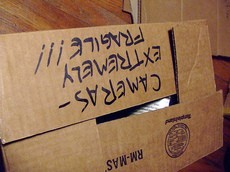 Moving insurance is one of those things that people usually think they can get by without.
Moving insurance is one of those things that people usually think they can get by without.
After all, your moving or relocation company will cover any damage or destruction of your property while it’s being moved and during transit. Right? Well, not exactly.
People also assume that even if the moving company doesn’t cover everything, then their homeowner’s or renter’s insurance will cover any damages.
However, the truth is while both of these types of insurance do cover some damages, they should not be relied upon when it comes to making sure all of your property is completely covered in the event of damage or complete destruction.
While it is true that moving companies do provide a certain amount of coverage with your moving package, you should always read your moving contract completely to be clear what exactly is covered, and for how much.
The reason is this:
Most moving companies automatically provide valuation, not insurance.
Damages That Moving Companies Cover
Here are the different types of valuation coverage that moving companies offer. Use this information to make an informed decision when choosing a moving company.
- Complete Value Protection: This is one of the better valuation coverages offered by moving companies, but keep in mind they don’t all offer it. This valuation coverage will cover property that is damaged, lost or even completely destroyed. It will also pay for repairs and replacement of your property. One thing to keep in mind though about this coverage is that there are usually minimum coverage amounts, and deductibles. So, while it sounds like a perfect world, there are catches to your moving company offering this type of valuation coverage.
- Assessed Value Protection: This is a good type of valuation coverage to have if your property does not weigh that much, and is valuable. This is the kind of coverage that is based on cost as opposed to weight. Basically what this means for you is that for a specified amount of money you can purchase so much protection per $1,000 worth of value. Warning: Make sure this is written on your bill of lading, otherwise your moving company may not have to honor it.
- Declared Value Protection Based on Weight: This coverage means that the moving company takes into account the total weight of all your possessions and then multiplies that weight by a particular amount per pound. For example, if the particular amount is $2.00, and your property weighs a total of 25,000 pounds, then your moving company would be liable for $50,000 with regards to if your property was damaged or destroyed. Your settlement would be based on the depreciated amount of the property that is damaged or destroyed.
Moving Company Contracts
Some facts that you may not know about moving company contracts are:
- Often the moving contract will state that the moving company is not liable for any damages incurred during transit. So, any settling the boxes do while the truck is moving, or if boxes are not packed well in the truck and fall over damaging something inside the box, or a piece of furniture next to the box, they would not be liable for those damages.
- In many moving contracts, the moving company states they will not cover damages to your property if you packed everything up yourself rather than allowing the movers to do it for you.
Another thing to keep in mind is that if your employer is relocating you and they have paid for a moving company to move your property from one location to another, there is no a guarantee that your property is protected. You need to make sure that you get a contact number and get a copy of the contract your employer has with the relocation company so that you know exactly how much coverage (if any) your property has. That way you can purchase more moving insurance, if necessary.
Does Homeowner Or Renter Insurance Cover Moves?
After you’ve read your moving contract carefully and determined whether or not you have the valuation coverage that you need for your items, and you are aware of any quirks there might be in the contract, what should you do next?
Your next stop should be to contact the insurance agent that handles your current homeowners or renters insurance policy. Ask them how much (if any) coverage you have on your personal property in the event of a move.
Many homeowners and renters policies cover some of the damage of your property while it is in transit, but typically they only cover about 10% — which isn’t much.
This is one of the reasons you should seriously consider purchasing additional moving insurance to cover your property both during transit and while transferring your items from inside your old home to the truck, and from the truck into your new home. That is often where the most serious damage to your property can happen.
While there are many different kinds of moving insurance, the one that most people choose when they decide to purchase additional insurance is called “Goods in Transit” moving insurance.
Most moving companies are more than happy to sell you this additional insurance. However, they may not have your best interest at heart, so be sure to check with your insurance agent first. Your insurance agent can also help you determine if you need even more moving insurance, and possibly offer advice as to which moving companies have the best coverage.
While many moving companies offer additional coverage in the form of moving insurance, my feeling is you would do better to purchase additional moving/relocation insurance through a standard homeowner’s or renter’s insurance agent.
More About Moving Insurance
- Should You Purchase Moving Insurance?
- 3 Important Moving Insurance Tips
- Reasons To Purchase Moving Insurance
My favorite things to write about are topics that have to do with pregnancy, weddings, saving money, living green, and life with dogs. When I’m not writing, I love to spend time with my husband, read, create 3D artwork and Native American beadwork.





